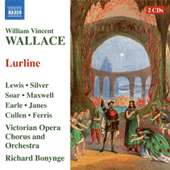|
Back
12/25/2011
William Vincent Wallace: Lurline
Sally Silver (Lurline), Keith Lewis (Rupert), David Soar (Rhineberg), Donald Maxwell (Baron Truenfels), Fiona Janes (Ghiva), Bernadette Cullen (Liba), Roderick Earle (Zelieck), Paul Ferris (Guilhelm), Victorian Opera Chorus and Orchestra, Richard Bonynge (Conductor)
Recording: Cosmo Rodewald Hall, Martin Harris Centre, University of Manchester, England (June 27-28, 2009) – 150’23
Naxos # 8.660293-94 – Booklet in English

Far off in a corner lie works from English-speaking countries which are (relatively speaking and regretfully) undiscovered in relation to the operatic world as a whole. Late 19th century Romanticism was at its zenith as was a bountiful collection of musical scores based on literary works and mythological figures. Lurline, William Vincent Wallace’s second triumphant work, centered around the legendary siren who haunts the historic Lorelei rock, luring men to their death as vengeance for her sweetheart’s betrayal. The fascination of such a mystical subject held such a tight grip that between the years 1846 and 1912 no less than eighteen composers developed music wrapped around this elusive character, one of those being William Vincent Wallace. His interpretation merits further examination and rightfully so.
After the successful premiere of Wallace’s first opera, Maritana, the Irishman was inspired to begin work on Lurline after a brief vacation on the Rhine River. Though details are sketchy, Lurline officially premiered on February 23, 1860 after Wallace expanded the score and returned from America after touring his Maritana.
A span of fifteen years between the two operas is significant in that the lyrical modes are light years apart. While Maritana heavily emphasizes poetic prosody, exhibiting many characteristic qualities of Jacques Offenbach’s later opéra-bouffe La Périchole (1868) in both subject and melodic harmonies, Lurline is more luscious and heavily weighted: it impresses upon the likes of Mendelssohn (especially in the Ouverture), Meyerbeer, Wagner (note Wallace’s undulating strings in Scene I’s introduction in comparison to Wagner’s Das Rheingold Prelude), and, to a lesser extent, Donizetti, all with a Germanic vein. It’s aesthetically beautiful. Wallace’s skills even elude to mid/mature Verdi.
Great credit goes to Richard Bonynge, impresario of esoteric and in-repertoire works, in this Naxos recording which would otherwise be neglected. Overall, the selected cast is well appointed and suitable to each individual’s vocal range. We extend a big thanks to capturing such a memorable opera.
Sally Silver’s voice is a collection of shimmering lyricism and gracious tonality to adorn and embellish the exacting qualities of Vincent Wallace’s music. Of note is her aria in Act I (“Flow on, oh, silver Rhine”) that’s closely aligned to Meyerbeer’s “Ombre légère” from Act II’s Dinorah featuring some tricky coloratura episodes which are delivered with professional excellence. Lurline’s counter protagonist, Rupert, sung by Keith Lewis is mindful of tenor Bruce Ford whom exhibits emotional dynamic qualities and flavorful coloring. Especially captivating is his Act I “Barcarolle” and the “Grand Duet” alongside Silver’s polished voice in “Oh, Lurline! My Naiad Queen.”
David Soar in the role of Lurline’s father, Rhineberg, has a majestic and commanding bass stature while Fiona Janes’ Ghiva delivers a smoky and satisfying allure akin to mezzo Teresa Berganza. Those in subordinate roles, Maxwell’s Baron Truenfels, Cullen’s Liba, Earle’s Zelieck and Ferris’ Guilhelm, all play substantial and structural definition to the ambrosial orchestration.
Any aficionado would enjoy a renewed acquaintance with an operatic segment that’s fallen off the charts: it is well worth the voyage. This recording as well as Wallace’s seminal work, Maritana, see here is a pleasant expectation to educate beyond the traditional boundaries of the given operatic repertoire.
Christie Grimstad
|